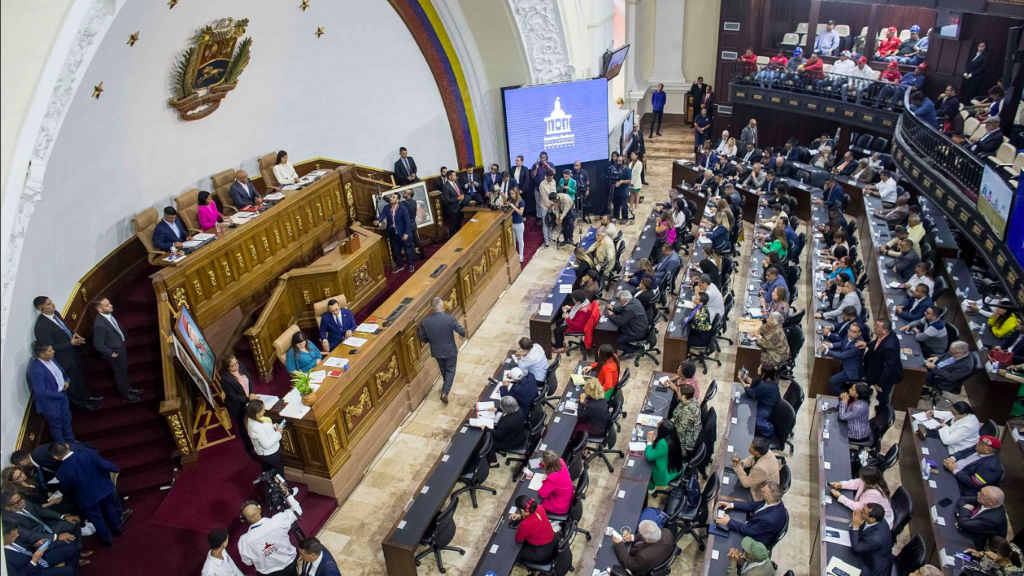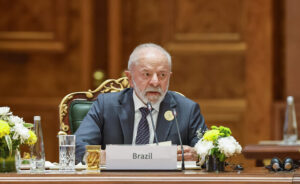
Published 09/10/2024 14:02 | Edited 10/09/2024 14:19
The National Assembly of Venezuela approved this Tuesday (9) an agreement requesting President Nicolás Maduro to sever diplomatic, consular and commercial relations with the Kingdom of Spain. The measure was a response to the decision by Spain’s Congress of Deputies to recognize Edmundo González, leader of the Venezuelan opposition, as the winner of the July 28 presidential elections, contested by the Venezuelan government.
The agreement was proposed by deputy Pedro Infante, from the United Socialist Party of Venezuela (PSUV), and approved after the support of the president of the Assembly, Jorge Rodríguez. In a speech before the vote, Rodríguez criticized external interference in Venezuelan affairs: “Patience has a limit. Spain does not interfere in Venezuela’s internal affairs, nor does the European Union, nor the Spanish government,” he stated, in a warning tone.
The rupture comes amid growing diplomatic tensions between the two countries. While the Spanish government has not yet formalized González’s recognition, the vote in the Spanish Congress was promoted by far-right opposition parties, such as the Popular Party and Vox, which are pushing for a tougher stance against Maduro’s government. González, in turn, has the support of international observers, especially North Americans, who claim that he would have obtained the majority of votes.
Investigation against González and exile in Spain
Edmundo González, former diplomat and ally of María Corina Machado, fled to Spain after an arrest warrant was issued against him for “usurpation of functions” following the publication of electoral records not recognized by the Venezuelan government. These minutes, according to the opposition, show that González would have won the election with around 70% of the votes. The government, however, claims that most of the documents released by the opposition were falsified, and the Venezuelan Public Ministry opened an investigation against the opposition leader.
González’s flight to Spain further complicated relations between the two countries. The Spanish Congress, in a vote promoted by the right-wing parties PP and Vox, approved a non-legislative resolution recognizing González as the elected president of Venezuela. Although Pedro Sánchez’s government refused to formally recognize González, Congress’s measure was enough to provoke a crisis with the Maduro government.
Chavista leader Jorge Rodríguez accused the opposition of falsifying 80% of the electoral records released and classified González’s recognition by the Spanish parliament as an attempt to revive the failed operation to support Juan Guaidó. “It seems that Spain wants to repeat Juan Guaidó’s mistake, which yielded no results and only harmed relations between the two countries,” said Rodríguez.
Commercial retaliation and end of diplomatic relations
As part of the retaliation, the Venezuelan National Assembly also approved the end of “all commercial activities by Spanish companies”, in response to what they considered “Spain’s most brutal abuse against Venezuela since colonial times”. Among the affected companies are large conglomerates with a presence in Venezuela, which could generate significant economic impacts for both countries.
Jorge Rodríguez, who presided over the Assembly session, stated that the Venezuelan response is necessary to protect national sovereignty and avoid any type of foreign intervention. “Venezuela is a sovereign country, which has its problems, but it also has its own institutions,” he said, criticizing Spain’s support for the Venezuelan opposition.
Criticism of the Spanish monarchy and new diplomatic scenario
In addition to the diplomatic rupture, the Venezuelan Assembly took advantage of the session to approve a symbolic agreement asking the Spanish government to abolish the Bourbon monarchy. Rodríguez classified the monarchy as an “institution linked to corruption” and an “expression of the extreme right”. He criticized the fact that, in the 21st century, there are still “blood rights” that allow certain families to control public power.
In addition to criticizing the existence of the monarchy, he stated that the Venezuelan parliament may discuss future resolutions on the independence of Catalonia and the Basque Country, in response to Spanish support for González.
While the Venezuelan opposition seeks international support, the Maduro government hardens its stance against any external interference, highlighting the country’s sovereignty as a non-negotiable principle. Thus, Edmundo González’s future remains uncertain, with him living in exile in Spain, with financial support from the Spanish far right, and awaiting the development of events to decide whether he will return to Venezuela to claim the presidency.
Source: vermelho.org.br

